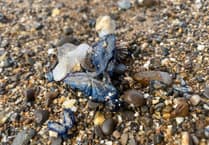Emergency food parcels have arrived in Devon to be distributed to the county’s most vulnerable residents, who have been told by the Government to ‘shield’ from Coronavirus (COVID-19) for at least 12 weeks.
Those identified as being at high risk of severe illness from Coronavirus because of underlying health conditions should have received a letter from the NHS with instructions on how they can best protect themselves.
People can also register themselves on the Government website if they have a medical condition that makes them extremely vulnerable to Coronavirus, or register on someone’s behalf.
Devon County Council has been urgently phoning these people over the weekend to find out what their needs are and how best to support them, particularly with anything they need immediately such as vital food and medical supplies or additional care.
The emergency food parcels contain things like bread, milk, apples, tea bags, ready meals, egg noodles, biscuits, porridge, custard, baked beans, squash, sugar. They are standard packages, which all contain the same food, but call handlers will be asking people if they have specific dietary requirements or allergies, so they can warn people the parcels may contain food they cannot eat.
Devon County Council immediately set up the call system on Saturday, March 28 and contacted around 400 people over the weekend and calls are continuing through the week. So far, approximately 60 of those contacted have said they need one of the emergency food parcels because they don’t have enough food to last the week and have no network of support.
Volunteer staff redeployed from other council services are busy packaging up the emergency food parcels at an undisclosed distribution hub on the outskirts of Exeter where the food, which was organised by Government and dispatched from a local wholesaler, arrived earlier today.
The parcels, which are free and contain seven days-worth of mostly non-perishable food for one person, will then be shipped out to district areas using Devon Highways vehicles driven by Civil Enforcement Officers from the County Council’s parking team.
District and city councils are locally managing the delivery of support within their communities to ensure the food parcels are delivered to residents as quickly and efficiently as possible.
Phil Norrey, Devon County Council’s chief executive, said: “Our absolute focus at the moment is to rapidly deliver vital support to our residents with the highest medical needs that put them at the greatest risk.
“The rigorous ‘shielding’ measures include minimising interaction by staying at home at all times and avoiding any face-to-face contact to prevent being exposed to the virus.
“But this means that thousands of our residents who are at high risk of severe illness from Coronavirus because of underlying health conditions could be left without vital food, medicine and care supplies, particularly if they live alone and don’t have family, friends or social care services to help them.
“We’re working with our district and city council colleagues to make sure these extremely vulnerable members of our communities continue to get the food, medicines and additional care they need as quickly as possible.
“I urge everyone, especially those in this highly vulnerable group, to follow the Government’s rules on staying at home and away from others, and we will continue to work around the clock to make sure the most vulnerable people are cared for and critical services continue to reach our communities.”
The Government has published guidance about the medical conditions that they consider make people extremely vulnerable, and the NHS is contacting those identified to provide further advice.
If you’re not sure whether your medical condition makes you extremely vulnerable, register on the Government website.
If you think you fall into one of the categories of extremely vulnerable people listed and you have not received a letter by Sunday, March 29 2020 or been contacted by your GP, you should discuss your concerns with your GP or hospital clinician.
Fraudsters are increasingly targeting individuals and organisations with emails, text, phone calls and WhatsApp messages offering advice, treatment, products and services for Coronavirus or asking for donations, so measures are also being put in place to ensure those making contact with vulnerable people about receiving support from the ‘shielding hub’ are reliably identifiable, and residents are aware that they will never be asked for bank details or request money.
The latest national advice on Coronavirus (COVID-19) is available on the Government website and NHS website.




